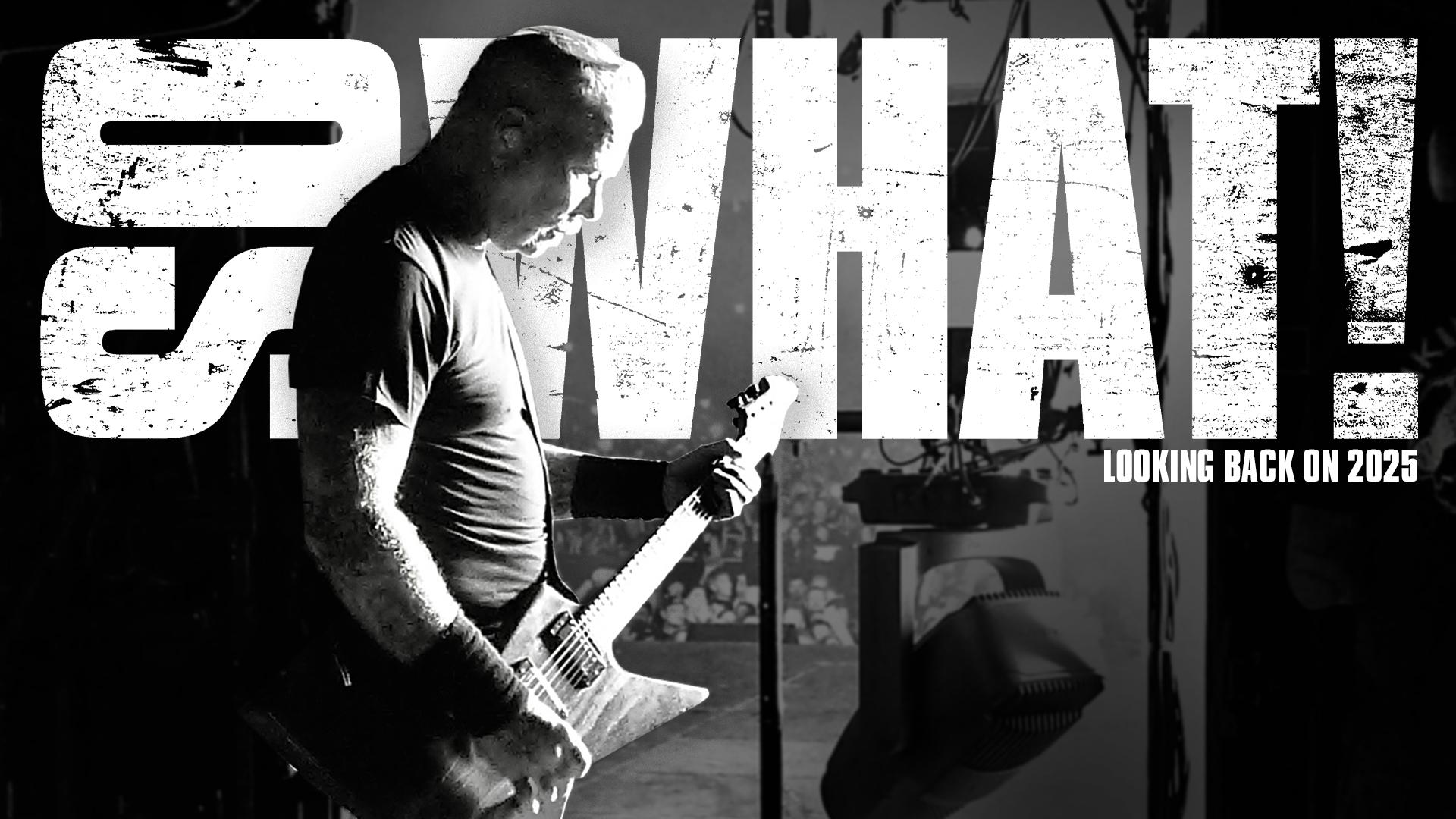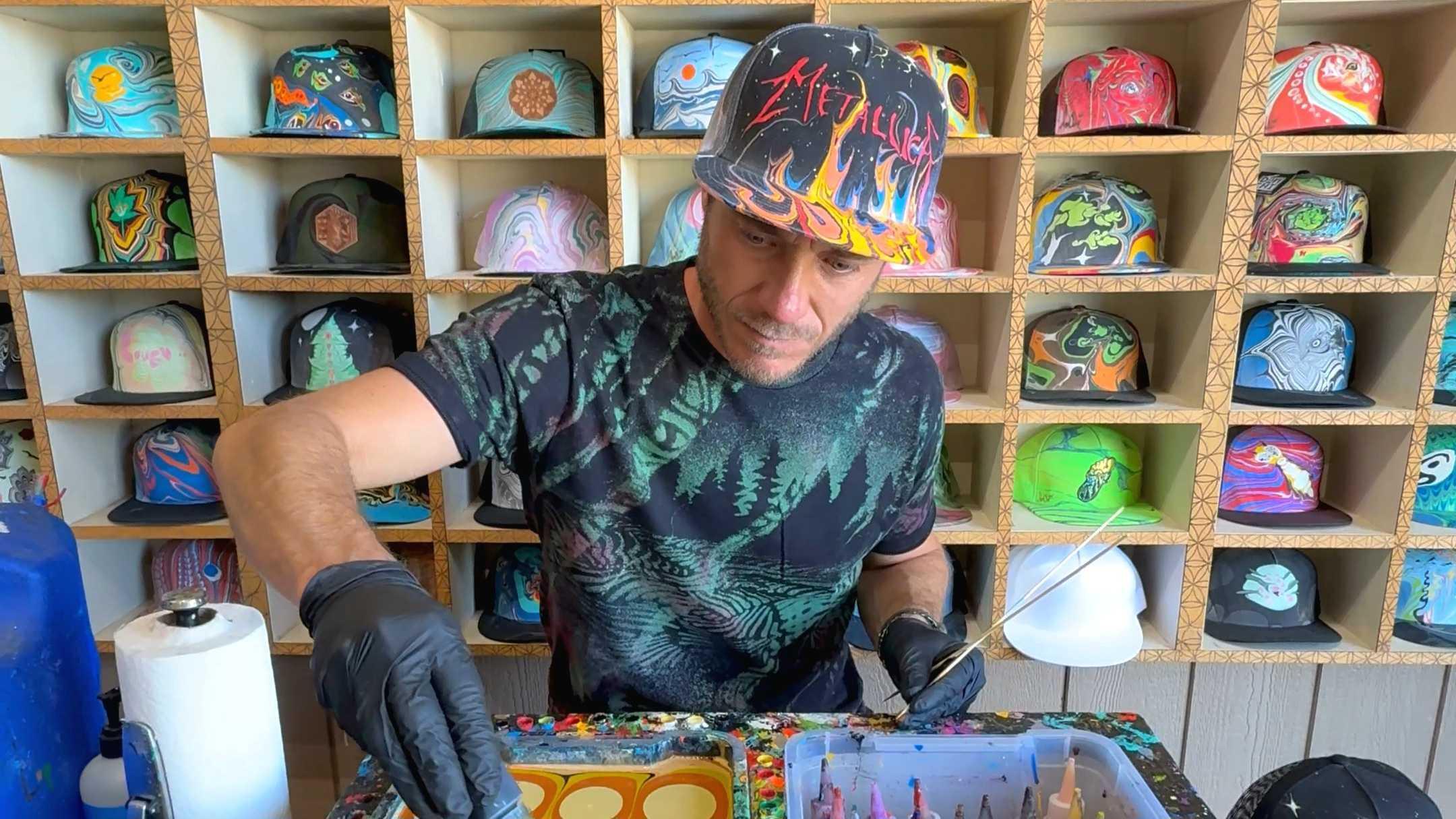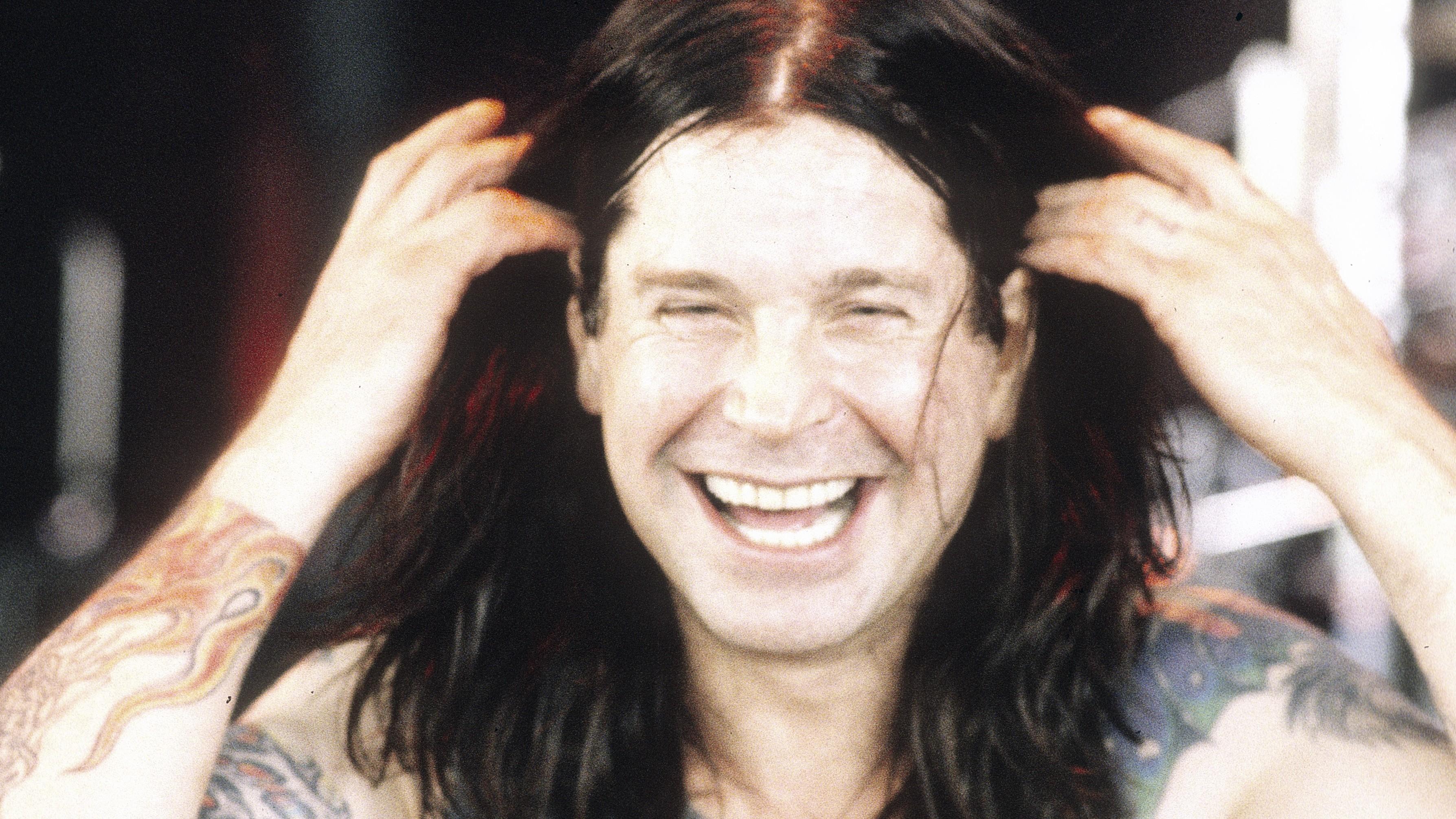
Looking Back on 2025
Some words and photos to look back on the year that was from So What! Editor Steffan Chirazi.
Aug 31, 2023
The production team behind 72 Seasons is precisely that: a team. Sara Killion – engineer and gatekeeper of all the raw facts and pathways behind 72 Seasons – has been the quiet, calm studio powerhouse who keeps all areas ticking. Moving from Denver to Los Angeles initially to pursue a career as a professional ballerina, Sara began interning at local studios in the LA area before working her way up to assisting sessions. Her first major credit was on the Red Hot Chili Peppers Stadium Arcadium album when she began working with Rick Rubin and Greg Fidelman, which evolved into working solely with Greg. Sara is modest, almost to a fault, and is not one to look for any spotlight. Indeed, she was initially reluctant to be interviewed about the project. Thankfully, Sara acquiesced to give us an insight into her world and the vital ingredients she brings to the studio stew.
Steffan Chirazi: We’ve been talking to Greg about his role with the band as maybe not just a producer but a psychologist and support system. Let’s talk about your role in this production beyond your engineering skills. It strikes me that, in terms of working with Greg and the band, you’re somewhat of a multilingual translator.
Sara Killion: I think I am basically the person who likes to keep everybody straight. I’m the one who will write all the notes on the things that are going on, just keeping track of all the things that happen throughout the day, making sure that if somebody brings something up, I can find what they’re asking or talking about.
SC: There’s not really one word that covers everything you’re doing.
SK: No. I mean, there’s so much of everything.
SC: I’d like to get a peek into your organizational skills and how you do it. I’ve seen that you’ve always got a yellow legal pad. You’re refreshingly analog.
SK: Oh, yes. I transferred from the legal pads to the Five Star five subject notebooks. On this particular record, I have four of them that are completely full, from front to back.
SC: There’s no digital recording?
SK: When it comes to my notes and keeping track of everything going on, I keep it all analog. I’ll take many pictures of gear and how microphones are set up; it’s nice to have the visual. But when it comes down to it, it’s easier for me to remember things if I write them down instead of typing them. Honestly, every activity that has happened is written down.
SC: Does Lars know that’s how you keep your notes?
SK: I think so. I know we'll all be in the room when we do drum editing and stuff. I am pretty much always in the room, far away from any camera, just observing.
SC: You don’t work for the CIA or MI5, do you?
SK: That’s funny. We joke that my mom works for the CIA because she travels a lot for work, and at home, everyone jokes, “Oh, is the CIA agent gonna stop by?”
SC: Is there a digital backup of these notebooks?
SK: No. It’s been discussed.
SC: Astounding…okay, getting back to the act of notetaking. Is it fair to say that, as an observer, you’re emotionless when expressing an opinion or note about what’s going on?
SK: Definitely. I’m keeping track of things going on, and I feel like that’s one less thing other people have to worry about because I’m here. I can tell you what happened on what day. Every once in a while, I miss things. There was one thing Lars said on the floor, “This song makes me feel like I’m riding down the freeway in a convertible, and the wind is blowing in my hair.” We were listening back, the band was on the floor, and I didn’t write that quote down. I remembered it but didn’t jot “riding in a car.” And Greg asked me about it three months later, and I specifically remembered not writing that quote down, and I was like, dang! Because there were a lot of other things going on, and that’s not the only thing I do.
SC: Right. And this is the world of Metallica, where the one thing you don’t do will be found.
SK: 100%, and I’m just, like, bummer! I was repositioning microphones and getting the ProTools, and all I kept thinking was that it was on video, recorded somewhere.
SC: You’re Greg’s co-pilot. You’re talking about mic repositioning, and if any technical things have to happen in the studio, you’re in there. How much of this is proactive, and how much of it is reactive regarding what Greg and the band need?
SK: I try to [predict] everything. When I’m getting everything set up or ready, I try hard to think of any scenario that could be a problem and do something proactively to eliminate that. But I will tell you, no matter what you do, it’s never enough. There’s always something that pops up, and you know, some things are just out of your hands. Some things are not. I like to be able to help out in a way that that’s one less thing anybody else has to worry about.
Being an engineer for Greg, I want him to focus more on the creative side of things as opposed to more of the technical stuff. There’s me and then Jim Monti, an excellent engineer who helped out a lot on this record. He’s been there since I have. And then Jason Gossman, too, of course. So the three of us try to help everybody as much as possible.
Photo Credit: Steffan Chirazi
SC: Regarding your work with Greg, you’re the senior partner. So, when you hear someone like Jason is fully coming on board in the studio, it is a whole different language. Do you take it upon yourself to bring him to “Metallica studio college” in a sense?
SK: Not so much. This band has very particular phrases or things they call certain things, like “guy,” for example. How they describe the different parts of songs differs slightly from other bands. Every band has its own language, and learning that language as you go [is important]. I don’t think about it until somebody looks at me in panic; then, I’ll help you out. So those different phrases, different parts of songs that, for example, I don’t want to throw Metallica under the bus, but they call a part of their songs “bridges,” and they’re the only ones I know that call what they call “the bridge.” With Metallica, the bridges are always smack dab in the middle of a verse and a chorus. Which I think is great. It’s fantastic, but it’s just that the terminology is different. It’s their language.
The thing about Jason is that he had a front-row seat because he started on tour with them. I know he’s worked on previous records, not quite as in-depth as this one for sure, and I feel like the experience he has had on tour with the guys helped in this situation because he has built a very good relationship with them. It’s been great to have him around.
SC: Do you feel your relationship with everyone is better than ever?
SK: I feel a lot more comfortable with the guys. I feel like before, if something happened and it was something that I would’ve needed to comment about, I would wait until everyone left, and then I would talk to Greg about it. So he can prepare for the next conversation with the guys. Now, I feel they have accepted me a bit more, so I make those comments in front of them if necessary. Not that it happens that often, but just in general.
SC: Do you think the band members have more appreciation for not just Greg but also Sara, Jason, and Jim? Do you feel a slightly different level of appreciation for the production team?
SK: I’ve always felt that from them. They’ve always been very kind and respectful, and they’ve always been amazing people. And the fact that they’re amazing people to us is… we’re not the big producer, and we’re not the fancy [team]. We’re just here to help them out; they know that, they respect us, and they appreciate everything.
SC: What about your “pandemic-education” as an engineer? Greg has spoken at length about some of the technological stuff he dealt with.
SK: For me, it wasn’t too terrible. I didn’t have to go in-depth with, “How is the Zoom call going to translate into Lars hearing this and playing to this thing that James did.” Greg and Jason worked a lot of that out, and the good news is Jason taught me all the stuff that he did, “Here is the best way to do this because we tried it 20 different ways, and this is the only way to go.” So, I lucked out! I feel everybody teaches each other how things work and how things go. Even with the Atmos mixing, Jim really dove into the Atmos mixing, and he explained everything: how we got here and how it works. So, it’s great for everybody to have the opportunity to learn and help each other.
SC: Are you any closer to wanting to produce in your own right and have somebody else be your gatekeeper?
SK: It’s a weird question. I feel like thinking that far into the future is very daunting. I love the engineering aspect of it. When I see what Greg does, it looks like a lot of work; it seems a little daunting to me. It’s never out of the realm, so yeah, eventually, at some point.
SC: Talk us through a day in engineering something that Greg’s working on. Without the notetaking, without the journals, put that aside because that’s another part of what you do.
SK: If we came in on a tracking day, everything would be set up already, which is a good thing. I would make sure all the mics are still in the same place. Things move, and I want to ensure that all the gear is still working. Then, we’ll do a line check to make sure everything’s sounding the way it should be. If anything’s wrong, I’ll fix it. I do a lot of second-nature stuff, and if I think [of it like a] step-by-step process, it probably is a little more in-depth. Greg mentioned that the drum set stays set up all the time. It is “record-ready” all the time. He’s not joking. Everything is plugged in; every mic and EQ is set exactly where it needs to be.
SC: When a project like this concludes, what do you like to do?
SK: One of the most exciting things for me after working on a record is getting into my car, cranking it on a stereo, and driving around, like, “Hey, yeah, it sounds so great.” Many times with the records we’ve worked on, not just with Metallica, you don’t hear the [actual] record for months until it comes out, so you’re sitting there with a particular song in your head. I’ve listened to it forever, and then I can’t hear it because I don’t have it. I’m done with the project, and I have to wait for it to come out on a CD or iTunes. The minute it does, it’s like, “Yes, I’m getting in my car!”

Some words and photos to look back on the year that was from So What! Editor Steffan Chirazi.

Dominic Padua (aka Dom Chi) does many things very well, including the art of marbling. Steffan Chirazi visits his Sebastopol, CA, studio to learn more.

What you are diving into here is my personal journal with regards to the Back to the Beginning extravaganza. Much of it was written off-the-cuff, and the sheer magnitude of the event means that even now there are still pieces of “thought” swirling in the ether and making brain fall by the hour. These recollections, emotions, and observations are shared reflectively over three separate entries after the event and are split between an initial “post-event download” and then a more chronological reflection on our time in Birmingham…